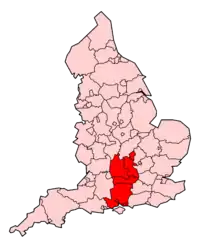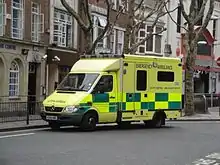South Central Ambulance Service
South Central Ambulance Service NHS Foundation Trust (SCAS) is the ambulance service for the counties of Berkshire, Buckinghamshire, Oxfordshire and Hampshire.[note 1] It is a foundation trust of the National Health Service, and one of ten NHS ambulance trusts in England.
| South Central Ambulance Service NHS Foundation Trust | |
|---|---|
| SCAS | |
 The NHS corporate identity logo of South Central Ambulance Service Foundation Trust | |
 Map of the South Central Ambulance Service's coverage | |
| Type | NHS foundation trust |
| Established | 1 July 2006 |
| Headquarters |
|
| Region served | Berkshire, Buckinghamshire, Hampshire and Oxfordshire |
| NHS region | NHS England |
| Area size | 3,554 Sq. mile |
| Population | > 4 million |
| Chair | Lena Samuels |
| Chief executive | Will Hancock |
| Website | www |
Services
As an ambulance service, SCAS primarily responds to emergency 999 calls, in addition to calls from the NHS non-emergency number, 111. These services are provided in an area that roughly covers the counties of Buckinghamshire, Oxfordshire, Berkshire and Hampshire. The exceptions are North East Hampshire which is served by South East Coast Ambulance Service (SECAmb) and the Shrivenham area of Oxfordshire, which is served by South Western Ambulance Service (SWAS).
The service also provides an emergency transport service for patients in life-threatening condition and a non-emergency patient transport service (NEPTS). The NEPTS transports patients unable to use public transport due to their medical conditions, patients using outpatient clinics and patients being admitted or discharged from hospital.[1] The trust also has a commercial division, which provides first aid training to members of the public, a community equipment service and logistic services.[2] Since 2017, SCAS has also run the NEPTS in Sussex and Surrey, within the South East Coast ambulance area.
It has a resilience and specialist operations department which plans for major or hazardous incidents.[3] This includes a Hazardous Area Response Team (HART), which responds to emergencies involving chemical, biological, radiological or nuclear materials, as well as major incidents.[4] The trust also trains and supports volunteer community first responders.[5]
The service is supported by its own League of Friends, a registered charity. The South Central Ambulance League of Friends raises funds that are used to enhance the standard of care for patients, provide additional benefits for service personnel, encourage the acquisition of essential life-support skills among the public, and support the deployment of volunteer community first responders. This group had been founded in 1982 to raise funds for the former Oxfordshire Ambulance NHS Trust.[6]
History

South Central Ambulance Service NHS Trust was formed on 1 July 2006, following the merger of the Royal Berkshire Ambulance Service NHS Trust, the Hampshire Ambulance Service NHS Trust, the Oxfordshire Ambulance NHS Trust, and part of the Two Shires Ambulance NHS Trust. The trust achieved Foundation status on 1 March 2012, becoming known as South Central Ambulance Service NHS Foundation Trust.[7]
In June 2011 it was named England's top performing ambulance service, managing to respond to 77.5% of Category A calls within the 8-minute target time, compared to the national average of 74.9%.[8] In October 2011, the BBC discovered that SCAS spent more on private ambulance services to cover 999 calls than any other service in the country.[9]
On 1 March 2012, the trust became an NHS foundation trust.[10]
In October 2013, the trust accidentally published on its website a document listing the age, sexuality and religion of all its 2,826 staff.[11]
SCAS took over patient transport services in Hampshire in October 2014.[12] In 2014, the trust held a recruitment drive in Poland to help fill vacancies.[13] On 1 November 2016, it was announced that the trust would take over the running of NEPTS in the south-east of England from April 2017.[14] The service had previously been run by South East Coast Ambulance Service until 1 April 2016, when it had been taken over by Coperforma, a private-sector provider which had been unable to provide a satisfactory level of service.
In 2015, the trust established a subsidiary company, South Central Fleet Services Ltd, to which 41 estates and facilities staff were transferred. The intention was to achieve VAT benefits, as well as pay bill savings, by recruiting new staff on less expensive non-NHS contracts. VAT benefits arise because NHS trusts can only claim VAT back on a small subset of goods and services they buy. The Value Added Tax Act 1994 provides a mechanism through which NHS trusts can qualify for refunds on contracted out services.[15]
Performance
Performance of SCAS is provided by national NHS England Ambulance Quality Indicators. In February 2016:
- The trust managed to respond to 70% of Red 1 calls[note 2] within 8 minutes (5% below the national target)
- 68% of Red 2 calls[note 3] were responded to within 8 minutes (7% below the national target)
- 93% of Red 19 calls[note 4] were responded to within 19 minutes (2% below the national target)
- Cardiac arrest survival rates were 16% (5% above the national average)
- 53% of stroke patients arrived at a thrombolysis centre within 60 minutes of their calls (1% above national average)
- The average time to answer 999 calls was 43 seconds (38 seconds below the national target)
- There were 21,024 incidents requiring patients being taken to an A&E department
- 42% of 999 patients were treated by paramedic crews only.[16]
Subcontracting
In 2019, the Care Quality Commission reported that ambulance services were relying on private providers because of lack of capacity. The trust spent more than £15 million in 2018/9 on private ambulances and taxis, which dealt with 989,811 999 incidents, an increase from 917,521 the previous year.[17]
Notes
- The SCAS area does not entirely match the county boundaries; see Services section.
- A Red 1 call is assigned to patients in cardiac arrest.
- A Red 2 call is assigned to other potentially life-threatening incidents, such as stroke, difficulty breathing or blood loss.
- A Red 19 call is assigned to other incidents in which patient transport is needed.
See also
References
- "Our Services | Patient Transport Service | South Central Ambulance Service NHS Foundation Trust". www.scas.nhs.uk. Archived from the original on 15 April 2015. Retrieved 5 May 2016.
- Choices, N. H. S. "Overview - South Central Ambulance Service NHS Foundation Trust - NHS Choices". Retrieved 5 May 2016.
- "Services". South Central Ambulance Service. South Central Ambulance Service NHS Foundation Trust. Retrieved 3 April 2018.
- "Our Services | Resilience and Specialist Operations | HART | South Central Ambulance Service NHS Foundation Trust". www.scas.nhs.uk. Retrieved 5 May 2016.
- "Our Services | Community First Responders | South Central Ambulance Service NHS Foundation Trust". www.scas.nhs.uk. Retrieved 5 May 2016.
- "Our history". South Central Ambulance League of Friends. 26 October 2011. Archived from the original on 8 December 2015. Retrieved 2 January 2015.
- "Local ambulance service achieves Foundation Trust status" (Press release). South Central Ambulance Service NHS Foundation Trust (SCAS). 1 March 2012. Archived from the original on 3 January 2015. Retrieved 2 January 2015.
- "South Central Ambulance Service has best response times". BBC News. BBC. 23 June 2011.
- "South Central Ambulance Service spends £10m on private providers". BBC News. BBC. 18 October 2011.
- "About Us | Who We Are | South Central Ambulance Service NHS Foundation Trust". www.scas.nhs.uk. Archived from the original on 27 February 2016. Retrieved 5 May 2016.
- "South Central Ambulance Service staff data breach". BBC News. BBC. 2 June 2014. Retrieved 26 December 2014.
- "Thousands transported by South Central Ambulance Service". Portsmouth News. Johnston Press. 21 October 2014. Retrieved 26 December 2014.
- "PARAMEDICS: South Central Ambulance looking abroad to fill 200 gaps in service". Milton Keynes Web. 23 December 2014. Archived from the original on 26 December 2014. Retrieved 26 December 2014.
- "Coperforma loses Sussex hospital transport contract". BBC News. 1 November 2016.
- "In full: Trusts with staff transfer plans". Health Service Journal. 14 February 2017. Retrieved 15 February 2018.
- "Ambulance Quality Indicators". www.ambulancestats.co.uk. Retrieved 5 May 2016.
- "Patients 'at risk' as NHS spends £92m on private ambulances and taxis". Independent. 27 August 2019. Retrieved 2 October 2019.